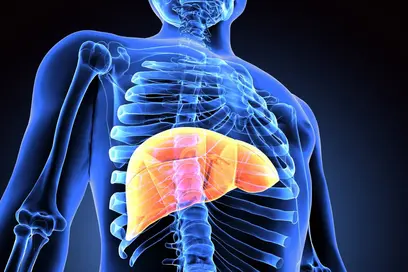Since medical technology has enabled physicians to irradiate tumors ever more precisely, radiation therapy has become part of the treatment regimen for about two thirds of cancer patients. Radiotherapy is well tolerated in most cases, but patients may also develop side effects. One debilitating side effect is radiation-induced fibrosis, which can lead to a significant deterioration in the quality of life.
Radiation-induced fibrosis can develop, for example, in the wake of radiation therapy to tumors of the urinary bladder or the lungs. In the case of breast cancer, up to five percent of patients are affected by fibrosis. “If physicians could tell already at the time of diagnosis whether a patient has a particularly high risk of fibrosis, radiation doses could be reduced or other treatment options be chosen," says Odilia Popanda from the DKFZ.
Fibrosis is a process of scarring by which healthy tissue is replaced by less elastic connective tissue, which leads to hardening and functional impairments. Radiation-induced fibrosis often occurs as a late effect several months or even years after the treatment. Unlike temporary side effects such as fatigue or diarrhea, fibrosis is an irreversible process.
Scientists know only a few genetic markers that are linked to increased susceptibility to fibrosis. These, however, are no satisfactory explanation why this condition is so common in cancer patients. Popanda and colleagues have now investigated evidence suggesting that certain epigenetic features might deregulate cellular signaling pathways that are key to the development of fibrosis.
“We were particularly interested if we could identify epigenetic variations indicating a high fibrosis risk prior to starting radiation therapy," Popanda explains. To this end, the team isolated connective tissue cells from skin biopsies that had been obtained from 75 breast cancer patients prior to radiotherapy. The researchers investigated the DNA of the cells by conducting a genome-wide analysis of its methylation patterns.
The investigators found a particularly significant correlation with later development of radiation-induced fibrosis in the genetic enhancer element of an enzyme called DGKA (diacylglycerol kinase alpha). Patients whose DGKA enhancer exhibited only low numbers of methyl groups later turned out to be highly susceptible to fibrosis. Christof Weigel, who is the first author of the publication, summarizes the complex cascade: “If this gene enhancer carries only few methyl labels, certain transcription factors can attach here and the DGKA gene is transcribed more frequently, which eventually leads to the activation of connective tissue cells."
When the researchers treated skin cells in the Petri dish with an agent that specifically inhibits the DGKA enzyme, the level of activation of connective tissue cells, which is assumed to be a critical first step in fibrosis, was lower.
Popanda and her colleagues are pleased to have not only found a marker indicating a patient’s fibrosis risk, but potentially also a way to prevent this debilitating side effect. DGKA inhibitors have already successfully been used to reduce cancer cell growth and to fight inflammatory processes. Therefore, they might also be used to prevent the development of radiation-induced fibrosis.
Christoph Weigel, Marlon R. Veldwijk, Christopher C. Oakes, Petra Seibold, Alla Slynko, David B. Liesenfeld, Mariona Rabionet, Sabrina A. Hanke, Frederik Wenz, Elena Sperk, Axel Benner, Christoph Rösli, Roger Sandhoff, Yassen Assenov, Christoph Plass, Carsten Herskind, Jenny Chang-Claude, Peter Schmezer & Odilia Popanda: Epigenetic regulation of diacylglycerol kinase alpha promotes radiation-induced fibrosis.
Nature Communications 2016, 10.1038/ncomms10893



